Tecnifibre Ice Code String Review
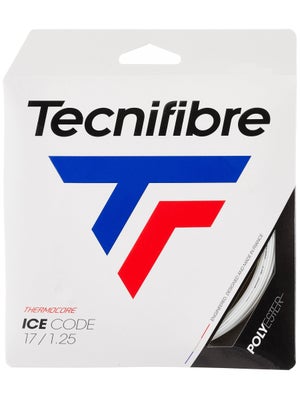
Summary
Although Tecnifibre is best known for its iconic multifilaments, the French tennis brand is no stranger to the world of polyester and has been pumping out quality polys since the late '90s. According to our playtest team, the latest addition to Tecnifibre's polyester family is not only a good string, it might just be Tecnifibre's most impressive poly to date. It's called Ice Code, and it earned outstanding scores across multiple categories, including playability duration, the Achilles heel of polyester strings. The strength of Ice Code lies in its stiff construction, which gave our players the control they needed to execute their most powerful strokes without hesitation. The ability to attack the ball with vicious stroke speed produced plenty of power and resulted in easy access to spin. Unlike other strings with comparable levels of control, Ice Code never felt dead, uncomfortable or "boardy," making it one of the more seductive control strings our team has tested. Although the string doesn't have any significant downsides, Ice Code is likely too underpowered for beginners or players with compact strokes. However, for the experienced player who wants a long-lasting poly with surgical targeting on full swings, Ice Code is as good as it gets.
Tecnifibre Ice Code String Scores
| Power | 62 |
| Spin | 92 |
| Comfort | 76 |
| Control | 95 |
| Feel | 77 |
| Playability Duration | 84 |
| Durability | 90 |
| Overall | 90 |
Control - Score: 95 / Power - Score: 62
Over the course of this multi-week playtest, the most unwavering feature of Ice Code was control. In fact, Ice Code received one of the best control scores our team has ever awarded. In other words, it was perfect for Michelle, who used Ice Code's control to do what she does best: swing for power. She said, "This string had the perfect level of control for my power game. I was almost in disbelief the first time I hit with it. No matter how big my stroke, the ball not only stayed in, but it also penetrated the court with loads of depth and pushed my opponent back. I felt like I could hit any shot, and I was able to cover the court more effectively knowing my offensive balls were coming back weaker, which allowed me to work the point patiently until I was ready to attack. Strung at 58 pounds, this string gave me exactly what I wanted: loads of predictable control and a low-powered response. I have to admit that I wasn't sure what to expect going into this playtest, but I have a new favorite string coming out of it."
Like Michelle, Chris also found it easy to attack the ball with Ice Code. He explained, "I really enjoyed having Ice Code in my racquets. This string offered me an ideal blend of power and control in my Tecnifibre TFlash 300 PS. With Ice Code strung at 48 pounds, I could take full cuts at the ball and get ample control to keep my shots well inside the lines, and I had enough zip to finish off points when given the opportunity. I also played very consistently with this string. I found I could trust Ice Code, take good cuts at the ball and still keep my error count low."
Spin - Score: 92
Ice Code doesn't have the sharp bite of Tecnifibre's Black Code 4S, and it isn't likely to make anyone's top 10 list of best spin strings ever made. However, with its ability to both snap back and accommodate explosive stroke speeds (two essential ingredients for spin), Ice Code gave our crew more than enough spin potential to bring the ball down hard. Chris had all the spin he needed with Ice Code in his racquet. He said, "Ice Code seemed to pocket the ball well, and the ball was exiting my racquet with plenty of spin. I wouldn't say I got insane rotation on the ball, but I got enough spin to add lots of control on big swings. I was able to find the angles I wanted and get the ball to dip nicely inside the lines. My slice serve out wide had enough bite to cut away and give me the occasional ace. Likewise, when I was looking to add a little kick, I was happy with the spin I was putting on the ball. At 48 pounds, it felt like I had the string installed low enough to allow it to slide around and do its thing."
Although Michelle has flatter mechanics, she still had no problem generating effective spin with Ice Code. She explained, "I found a good amount of spin when I needed it. This was most apparent when I was a bit late or my timing wasn't perfect, and I brushed up a bit 'helicopter-y' and was able to access spin and still get the ball to drop in between the lines. I also found nice access to spin when serving. I was getting loads of kick and bite on the ball when sliding serves with slice. I almost never found the ball sailing unpredictably when I added spin to my shots."
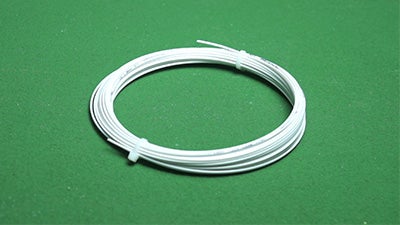
Comfort - Score: 76 / Feel - Score: 77
In our Tennis Warehouse University String Lab, Ice Code posted a stiffness score that places it on the firm side of the spectrum. It's not designed for those who want the plush and springy feel of a multifilament or natural gut. Having said that, our crew never thought the string felt uncomfortable, and they loved its firm feedback and predictable response. Michelle, who typically plays with a firm poly, was right at home with Ice Code. She said, "I constantly joke that I am NOT the playtester you want to ask about 'feel.' The less feel, the better for me. I like the opposite of natural gut. With that being said, this is everything I look for in a string. It's dead, predictable and firm. The tension I string at confirms that I prefer a stiffer response. However, even at 58 pounds, I had zero issues with comfort. Just know that Ice Code is not a soft poly. There are probably only a handful of strings that have left me with some discomfort, and this was not one of them."
Chris found great touch and pocketing with this co-poly. He commented, "Despite being a firmer type of string, I thought Ice Code offered some nice ball pocketing. The feel was far from overly firm, and I was surprised to see how stiff the string registered in our lab. On court, Ice Code offered ample give, which enhanced the touch I had. I didn't have any comfort issues throughout the test."
Playability Duration - Score: 84
Judging from the scores and comments of our playtesters, Ice Code had above-average playability duration. Although it lost some tension as the weeks wore on, Chris found that this string played great deep into the playtest. He explained, "I like to get two to three weeks of playability out of my polys. Since I test a lot of strings, I might not always get to log a huge number of hours on a particular string, and it can be frustrating if a string goes dead in my racquet before I've had the chance to fully put it through the wringer. Fortunately, Ice Code held up well. I was still happy with its performance into week three, although it obviously wasn't feeling as impressive."
Michelle was more than a little impressed with how well Ice Code performed over time. She commented, "I was in a bit of disbelief each time I stepped on the court with Ice Code and found it to play just as effectively as when it was strung fresh. While I know the tension dropped, it never felt like it did; it played consistently through the playtest. I absolutely despise strings that get springy and elastic when they bag out, and this never happened with Ice Code. By the third week I was expecting it to be unplayable, and I was surprised that it was still working well. The tension drop became a bit more noticeable in the middle of the third week, and I would probably cut strings at that point. However, Ice Code had a longer life span than many of the strings we use week in and week out."
Overall - Score: 90
| Chris' Scores | |||
|---|---|---|---|
| Power | 6.4 | Feel | 9 |
| Spin | 9.3 | Playability Duration | 7.7 |
| Comfort | 7.2 | Durability | 9 |
| Control | 9.5 | ||
| Overall | 9 | ||
| Michelle's Scores | |||
|---|---|---|---|
| Power | 6 | Feel | 6.3 |
| Spin | 9 | Playability Duration | 9 |
| Comfort | 8 | Durability | 9 |
| Control | 9.4 | ||
| Overall | 9 | ||
Shop Tecnifibre Ice Code
Tecnifibre Ice Code

Playtester String Setups
Michelle:
Playtest Racquet: Wilson Pro Staff RF97 Autograph
Playtest Tension: 58 lbs
Typical String: Solinco Hyper-G 16
Chris:
Playtest Racquet: Tecnifibre T-Flash PS 300
Playtest Tension: 48 lbs
Typical String: Volkl Cyclone 16
String Installation Grade
String Installation Grade: B+
Coil memory: Moderate
Friction burn on crosses: Low
Knot tying: Moderate difficulty
Notching: None
Clouding: N/A
Other problems: None










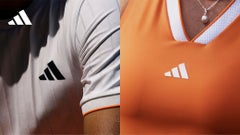

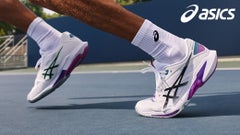


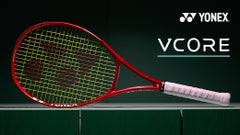



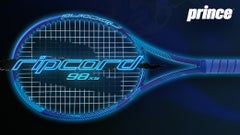

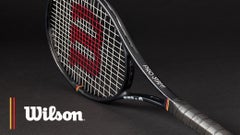


What type of player would you recommend this to?
Michelle - "Big hitters will love this string! Specifically, big hitters who look to their strings for control. Also, players with long strokes who find themselves missing long more often than not. This string answers all the problems for those players, whom I can identify with."
Chris - "Ice Code is a solid option for the player seeking spin, control and feel from a poly."
Likes
Chris - "I love the overall feel and response. The blend of power and control is spot on for me. I also like the solid access to spin."
Michelle - "The control gives me the absolute confidence to play my best tennis and hit out without fear of missing. I'm striking the ball better than I have in a while with Ice Code in my racquet. Plus, the durability and playability duration is exceptional. I kept waiting to cut my strings out and didn't even notice a drop in playability until the middle of the third week of use. This string goes into my top three for sure!"
Dislikes
Michelle - "None to report!"
Chris - "None."
Comparing the string to others they've tried, our testers said:
Chris - "Ice Code is right up there with some of my favorite strings, such as Volkl Cyclone and Solinco Hyper-G. Like those strings, Ice Code plays with enough give to make it comfortable, yet it doesn't sacrifice any control. Another string I am reminded of when hitting Ice Code is RS Lyon. I find the level of ball pocketing and the playability duration to be similar."
Michelle - "I love Solinco Hyper-G, and I put Ice Code right up there, possibly above it. The low-powered, controlled feel is similar, as is the great access to spin. It is firm and durable without being uncomfortable. Luxilon Savage is also one of my favorite strings for the same reasons: low powered, nothing too fancy going on, comfortable enough for me when strung at high tensions, predictable response. Ice Code initially reminded me of how much I like Savage."